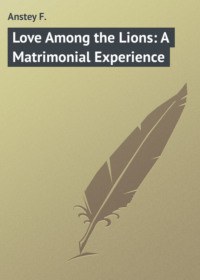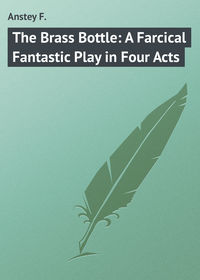
"That's all right," he said. "There's one thing," he added, thinking aloud, "if I did learn to ride decently, you and I might go out riding together, what?"
"It's rather early to talk about that," said Daphne, "when you haven't even begun to learn."
"I know, but I will begin. For your sake."
"No, Prince Clarence, for your own," she replied, "though I shall be glad, too. And now, I mustn't stay here any longer."
Why, he asked himself, after she had gone, was she so keen on his cutting a figure at Court? The answer was obvious – he had interested and impressed her more than he could have hoped. But that, he shrewdly perceived, only made it more necessary for him to be wary. She was certainly a most fascinating girl, but if she had any ambitious designs on him, she would find that he was quite capable of taking care of himself. Still, she was right about his riding. Every Prince ought to be able to ride. It would not take him long to learn. And when he could ride he would go out hunting. She would think a lot more of him when she saw him returning in triumph with a few boars and bears as trophies of the chase.
Accordingly he took the earliest opportunity of mentioning to his family that he intended to take lessons in horsemanship, which both the King and Queen considered an admirable idea. The Marshal was consulted, and though he opposed it at first, on the ground that anything which might affect the succession to the throne was to be avoided, he gave way in the end, and undertook to act himself as Clarence's riding master. Clarence was prudent enough to stipulate that none of his family should be present while he was undergoing instruction, and the Court were not to be informed that he was having any lessons at all until he had completed the course and become an accomplished equestrian.
"Well, my boy," said the King, when the Crown Prince entered the Royal Parlour after his private lessons in the Palace tiltyard. "Well, and how did you get on, hey?"
"Never got on at all," Clarence reluctantly admitted. "Not likely I should, when there wasn't a bally gee in the stables that would let me come near him!"
"Clarence!" cried his mother, "you don't mean to say you've been there all this time without riding a single horse!"
"I'd have ridden 'em right enough, if they'd let me get on 'em – but they wouldn't."
"And pray what was the Marshal about?" inquired the Queen.
"Well, he was laughing most of the time; it's my belief he'd had 'em all gingered up beforehand."
"I'm quite sure, Clarence, he would be incapable of such conduct as that. Why should he?"
"I don't know," he said. "But I won't have him about again. I'll get some one else to teach me."
"But, my dear boy, nobody can teach you much if you can't even manage to get on a horse's back. You'll only get hurt if you try any more, and you will be far wiser to give it up altogether."
"Not much, Mater!" he declared; "I'm not so easily bested as all that. Now I've begun I mean to go on with it."
And he went on; for, to do Clarence justice, want of pluck was not among his defects. But he was obliged to admit that the Marshal was not fairly accountable for the horses' behaviour, since they were quite as unmanageable when he was no longer there.
They were spirited creatures, but perfectly docile until they caught sight of Clarence, when they immediately became as vicious as the most untameable bronco. If he contrived occasionally to get hoisted into the saddle, he never remained there long enough to put the Royal Chief Huntsman's instructions into practice, and he began at last to have serious doubts whether Nature had ever intended him to shine as a horseman.
He said nothing of these ignominious experiences to Daphne, partly because he never found an opportunity, though more from a fear of being laughed at. But he could not keep them from his family, and so Daphne came to hear of his repeated failures through Princess Ruby. She did not laugh at them, however; she was even a little touched. She thought more of him for his attempts to follow her unlucky suggestion than if he had never attempted anything at all, and fully believed that if he persevered he would conquer in the end.
His Royal Mother was so perturbed and alarmed that at last she made a confidant of the Court Godmother, who was about to depart on her annual visit to the Court of Clairdelune. "He will go on with it!" Queen Selina lamented, "and I know he'll break his neck before long! It does seem so strange that those horrible horses should behave like this with Clarence and nobody else. When his poor dear Grandfather was such a good rider, too! I can't think why they should, Court Godmother, can you?"
The Fairy Vogelflug thought privately that the reason was not very far to see. The horses of the Royal stud were, she knew, of an exceptional aristocratic breed. Now poor Clarence, though of Royal blood on his mother's side, unfortunately had little of the air and appearance which these intelligent and observant animals probably connected with a true Prince. It was more than likely that they had failed to recognise that he was a Prince at all, and so resented being called upon to carry him.
But, though she could be out-spoken enough on occasion, she felt that this was hardly an explanation she could give to his mother. "Well, my dear," she said, "it's very trying for you, of course. But I don't know that there's anything I can do."
"I – I thought perhaps," said Queen Selina, with some natural hesitation, "that you, as a Fairy, might – er – know some quite simple little spell which – "
"As I have told you before," interrupted the Fairy, "I make a point of using my knowledge of Magic as seldom as I can nowadays. I have my health to consider. And, in any case, I am acquainted with no spell for making a Prince into a horseman. Princes in Märchenland," she added, rather unkindly, "have never needed such aids."
But, after all, she was anxious that this Royal family, whom she had been largely responsible for importing, should do her as much credit as possible, and so she applied herself to think of something that might be of help to the unfortunate Crown Prince. A means occurred to her at length, but as she was by no means sure that it would be effectual, she was careful not to commit herself.
She did not even mention it till she was on the point of starting for Clairdelune, and then, before she stepped into her dove-chariot, she suddenly said to the Queen, á propos of nothing in particular, "By the way, my dear, that jewel you were wearing when you first came – I haven't seen you with it for a long while – how is that?"
"Well, you see, Court Godmother, my Crown jewels seem to suit me so much better."
"Then, if you don't want that pendant yourself, you had better give it to your son."
"To Clarence?" cried the Queen. "Why, what use would it be to him?"
"It is a jewel which any Prince might be proud to wear," said the Fairy; "and I should strongly advise you to see that he wears it. Not merely now and then, but constantly. It may – mind, I don't say it will– but it may bring him better luck than he has enjoyed as yet."
"But really, Godmother, I can't quite believe that a thing – " began the Queen, when the Fairy cut her short unceremoniously.
"I've no time to stay here arguing about it," she said; "my doves will be catching cold if they stand about any longer. By all means don't take my advice if you don't believe in it; I merely thought you might find it worth trying – but you must please yourself. And now, with your permission, I'll take my leave of you."
At a sign from her, the team of doves fluttered up in a snow-white cloud and winged their flight to the neighbouring Kingdom of Clairdelune, where she had another Royal Godson, Prince Mirliflor, in whose affairs she took a keener interest than she could in Clarence's.
"Old people have such queer ideas," thought Queen Selina, as the chariot rapidly receded from sight. "As if that twopenny-halfpenny pendant of Miss Heritage's could – but the Court Godmother will be annoyed if I don't follow her advice – and it's best not to offend the old creature. I'll go up and see if it's still in my jewel case."
It was, and she brought it down in time to intercept Clarence as he was starting in rather low spirits for another crowded hour of anything but glorious life in the Riding Court.
"Clarence, my boy," she said, "I want you to oblige me by wearing this in future."
"What – that thing you bought before we came away!" he replied. "I say, Mater, you don't expect me to go about with a woman's pendant on my manly bosom!"
"Your Godmother Vogelflug thinks it is quite a fit ornament for a Prince," urged his mother, "and – and she as much as said that it would bring you good-luck."
"Did she, though? Well, I could do with a bit of that for a change." And he allowed her to fasten the chain round his neck. "By Gad, makes me feel like a Good Forester or a Member of the Ancient Order of Buffaloes or something!" he remarked.
"Never mind," she said; "and it really doesn't look so very out of place. But remember, Clarence, if it's to do any good, you must wear it always."
"Right-oh!" he said; "and now I'll go and take my usual morning toss, what?"
Half an hour later, he came into the Royal Parlour, where his family were assembled, Daphne being with them. He looked round the circle with a satisfied air, and then said in a tone of studied carelessness, "If you've nothing better to do just now, all of you, you may as well look in at the Riding Court in a few minutes, and see how I'm getting on. I – er – should like Lady Daphne to come, too, and the whole Court. Tell 'em to hurry up. You'll find me down there ready for you." He was gone before they had recovered from their surprise.
"Dear me," said the King, "I'm not quite sure that it would be wise to have the Court looking on just yet, eh, my dear?"
"I have every confidence in Clarence," said the Queen. "He would not have suggested that they should attend unless – but perhaps a smaller audience, of just ourselves, might be less trying for him."
So it was only the Royal family and Daphne that went down to the Riding Court, where, to Queen Selina's alarm, some very formidable-looking jumps had been put up.
"He's never going to be rash enough to try to get over those!" she said. "Tell him he's not to run such risks. I can't allow him to!"
Just then Clarence cantered in on a high-spirited mare, over which he seemed to have complete control. He put her at obstacle after obstacle, and surmounted all of them with the greatest ease. To prove that he was equally at home on any mount, he had several other horses brought in, and over each he showed the same mastery, and a seat with which Daphne, who was critical in such matters, could find no fault.
"You young dog!" said his father, when the exhibition was over and Clarence had dismounted. "So you've been taking us in all this time, pretending you couldn't stick on a horse for more than a few seconds, hey?"
"Oh, well," he said modestly, "I didn't like to say too much. Fact is, it's only quite lately that I've felt what you might call at home on a gee."
The Stud grooms could have testified how very lately this was if they had thought proper to do so – which, of course, they did not.
"It only shows what can be done with a little perseverance," said Queen Selina. "Clarence, you will be able to ride through the City now!"
He managed to get Daphne to himself for a few minutes on the way back to the Palace.
"Well, Lady Daphne," he began, "I've done what I could to please you, and I hope you are satisfied, what?"
"Indeed I am, Prince Clarence," she said warmly, for he had risen several places in her esteem during the past hour. "And I congratulate you most heartily. And now things will be ever so much pleasanter for you, won't they?" As she spoke she noticed the pendant, which, of course, she recognised immediately.
"Ah, you're looking at this," he said. "Daresay it strikes you as funny my wearing it?"
"Not at all, Sir," she replied; "it isn't really a woman's ornament." She did not tell him how she knew it was not, for she had not forgotten her undertaking to say nothing about it.
"Well, it was the Mater's," he said. "She's made me promise to wear it always. Thinks it may bring me luck."
"I hope it will, Prince Clarence," she said, quite sincerely; and, as the Queen happened to look back just then and summon her sharply to her side, that was all that passed between him and Daphne on that occasion.
She was rather pleased than otherwise that he should be the possessor of the pendant. As has been said, she had never known her father, so there were no tender associations attaching to it. And she had been a little afraid that Mrs. Wibberley-Stimpson had only bought it out of consideration for her. It was some relief that she had found a use for it. Daphne was, of course, quite unaware who her unknown father had been or that the pendant was a badge of his princely rank; and both the Queen and her son had no suspicion of the truth. Nor did either of them connect it with his suddenly acquired mastery of the whole art of horsemanship, Queen Selina believing that his reports of previous unsuccess had been intended to increase the surprise of his triumph, while Clarence naturally found it easy to persuade himself that he had been learning more from his disheartening failures than he had been conscious of at the time. He certainly did not hide his new talent in a napkin, but organised riding excursions of the lords and ladies of the Royal household, at the head of which he made a very gay and gallant appearance on a prancing bay palfrey. Only there was one thorn in his luxuriously padded saddle. He had hoped that he might have the pleasure of commanding Daphne to ride by his side on these excursions, but, though she accompanied them, it was never on horseback. Queen Selina, it seemed, had developed such a preference for her first lady-in-waiting's society that she was always required to accompany her in the Royal coach.
Daphne would willingly have dispensed with this and other signs of the marked favour with which her Sovereign was overwhelming her just then. She had no illusions as to the motives. The Queen thought – most mistakenly, as it happened – that making a favourite of Daphne was the surest method of snubbing and annoying her other ladies-in-waiting, for whom she had begun to conceive a hearty dislike.
The dislike was certainly reciprocated. They resented their Royal Mistress's insolence as much as they despised her previous obsequiousness. They accepted the fact that she was their Queen, but, among themselves, they did not pretend any respect for her, as was manifest from their habit of referring to her in private as "Mother Schwellenposch!" Edna, who was scarcely more beloved, was known as "Princess Four-eyes," in allusion to her pince-nez. Daphne found it hard at times to refrain from joining them in this irreverence, but, while she saw the Queen's and Edna's weak points as clearly as her companions – and indeed more clearly than any of them – her sense of loyalty kept her silent. She might laugh when she was alone, and frequently did, but that was a relief to her feelings for which she felt she need not reproach herself very severely. Another reason for Queen Selina's insistence on Daphne's company in the coach was, as she was fully aware, the desire to keep her at a safe distance from the Crown Prince – a needless precaution which had its amusing side for her.
Still, she often longed to be on a horse instead of being shut up in a great lumbering vehicle with the Queen and the Princess Royal, even if Princess Ruby's presence did something to make things less dull. On one of these expeditions Queen Selina had once more provided herself with a sack of gold from which she and the Princesses scattered largesse.
"You may throw a little if you like, Miss Heritage," said the Queen graciously. (She reserved the title "Lady Daphne" for occasions when the Court was present.)
"I'd rather not, your Majesty," she replied. "I mean," she explained, "it's not as if it was my money."
"I should have thought," said Edna, "that that was all the more reason for throwing it away." And as she spoke she flung a handful to a stout old citizen, who glared with indignation – not at her, however, but at the nimbler and needier persons who had grabbed most of the coins before he could stoop to pick them up.
Daphne felt rather ashamed of these proceedings, which seemed to her not merely undignified, but likely to demoralise the public. But she said nothing.
"We're not doing this out of ostentation, Miss Heritage," explained the Queen, who seemed to have divined something of her sentiments. "It's policy. You may have noticed that we've not been nearly so well received lately. Why, I don't know, unless there's any ill-feeling about those detestable little Gnomes."
There was a good deal. The Gnomes, having no employment on the golf-links, had recently broken out of their compound and found their way into Eswareinmal, where they made themselves very much at home. They quartered themselves on several of the householders, and, having discovered that cooked food was more palatable than earth, they had no diffidence in helping themselves. In other respects they were inoffensive and inclined to be sociable, but, even in Märchenland, the most harmless and playful Yellow Gnome is not considered a desirable addition to any respectable family. The citizens one and all regarded their visitors as intolerable nuisances for which they had to thank their Sovereigns.
"It was his Majesty's idea to free them," the Queen went on. "I was always in favour of keeping them in the mine, where they were out of mischief. And they certainly mustn't be allowed to run about loose any longer. They ought to learn some sort of discipline. Perhaps the best thing would be to train them as Boy Scouts… Have you caught cold, Miss Heritage? You seem troubled by a most distressing cough."
King Sidney himself had begun to doubt whether the enfranchisement of the Yellow Gnomes was quite one of his happiest inspirations. Such Märchenlanders as had been induced to enter the mine were demanding wages which left but a small margin for profit, especially when it was considered that, if their methods of working were more systematic than their predecessors', they somehow got very much less gold. No sacks at all had been delivered of late, and the shelves of the Royal Counting-house were beginning to look ominously bare.
He forced himself to mention this to the Queen after the drive that afternoon, and point out the necessity for being rather more economical than they had been hitherto. "I'm sure, Sidney," she protested, "no one can say I am extravagant! It was absolutely necessary to have the whole Palace done up – I had to order some new dresses, as I couldn't be expected to wear ready-made robes in my position, and one or two tiaras and things from the Court Goldsmith, whose charges certainly were disgracefully high. Then the household expenses come to several sacks a week, try as I may to keep them down!"
"I daresay, my love, I daresay – but I hear there was another sack emptied only this afternoon – and we really can't go on like this!"
"Then I shall have to give up driving out altogether, Sidney. You've no idea how unpopular you've made us all by releasing those wretched little Gnomes. The people object to having to associate with them – and I'm sure I don't wonder. You simply must find some way of getting rid of them!"
"The Court Chamberlain tells me a certain number could be taken on the Palace Kitchens as extra scullions."
"And we shall have them getting upstairs and running about all over the Palace!"
"Oh no, my dear; there will be strict orders against that. But, to return to our expenses, I'm afraid Clarence hasn't been as careful as he might have been, and I shall have to speak to him very – "
"No, you will not, Sidney. I won't have you scolding Clarence just when he's doing so well – riding and going out hunting and making himself a social leader. You can give him a hint to be less extravagant if you like – but no more. But the first thing you have to do, is to settle the trouble about those Gnomes. You'd better ask the Marshal if he can suggest anything."
The Marshal's solution was simple but practical. There was, it seemed, a marshy tract at a considerable distance from the capital which needed draining and reclaiming – a work which the more able-bodied of the Gnomes could carry out under strict control. So the majority were deported to the Märchenlands, the remainder being employed in the Royal Kitchens as supernumerary and highly incompetent scullions.
Whether a damp climate would suit the Gnomes' constitutions was not a matter of general concern. Most of them had been supplied with jerseys, which, if they made them look more hideous little objects than ever, had been knitted expressly for them by the Queen and her ladies-in-waiting – and what more could they possibly want?
The citizens of Eswareinmal witnessed the exodus of the gnomes with profound relief, but without any outburst of gratitude to their Sovereign. It had somehow been allowed to transpire that they owed their deliverance entirely to the statesmanship of the ex-Regent.
CHAPTER IX
THE PLEASURES OF THE TABLE
King Sidney's remonstrances to Clarence on his extravagances were put in too mild a form to offend. "Perhaps I have got through rather a lot lately," the Crown Prince admitted. "Not that I spend much on myself – precious little chance in a bally place like this. It mostly goes in tips. You see, the peasants about here think anything under a purse of gold stingy. But it certainly struck me the last time I went to the Counting-house that what sacks there were looked a bit flabby. When do you expect some more in?"
"The Lord Treasurer thinks one or two may be delivered in a week or so – but we shall want considerably more than that to pay our way, and I don't see myself where it's to come from."
"I suppose," said Clarence, "it wouldn't quite do to have the gates melted down, or the thrones; but there's any amount of other gold furniture knocking about – what's the matter with coining that?"
"It did occur to me," confessed King Sidney, "but the Court Chamberlain says they're only silver gilt, and that's no good here, you know."
"Well," said Clarence, "it's pretty clear that we shall all be in the cart if we can't find some way to raise the wind."
A day or two later he burst into the Royal Parlour where his father was sitting disconsolately alone. "I've found it, Guv'nor," he announced triumphantly.
"Eh, my boy, found, what?"
"The way to raise the wind. I've been in to see little Pop-Eye —you know, the Astrologer Royal."
"Xuriel? I haven't seen him since that – er – match I played with the Marshal."
"I daresay not. The Marshal saw him, though – and he hasn't been fit to be seen in public since. Well, it seems he's been pottering away at Magic all this time on the quiet – and quite lately he's come upon an old spell-book of his father's and tried some of the formulas in it. And he's turned out one little thing that's simply it. I bought it of him on the spot. I'll have it brought in here for you to see."
When it was brought it was not much to look at, being just an ordinary round table of the plainest design.
"Ah, but you wait," said Clarence. "Just say to it 'Little table, be laid.'"
"Really, my boy," protested his father, who had evidently forgotten his Grimm's Fairy Tales, "I can't bring myself to – "
"Try it, Guv'nor – and see what happens."
"Oh well, it's all nonsense – all nonsense – but – er – 'Little table be laid.'"
Instantly the table was covered with a snowy linen cloth and laid with a daintily prepared meal for one person, including a small flagon of wine and a knife and even a two-pronged fork.
"Neat, isn't it?" remarked Clarence. "The little joker wouldn't part with it at first – afraid of getting into more hot water about it."
"I don't suppose for a moment the food's genuine," said the King. "Well," he pronounced, after trying it, "I'm bound to say it's quite tasty – really very tasty indeed. I think I'll have a little more – ate so little at lunch. The wine isn't at all bad either – sort of Moselle flavour. It would be awkward if your mother were to come in just now, eh?"






